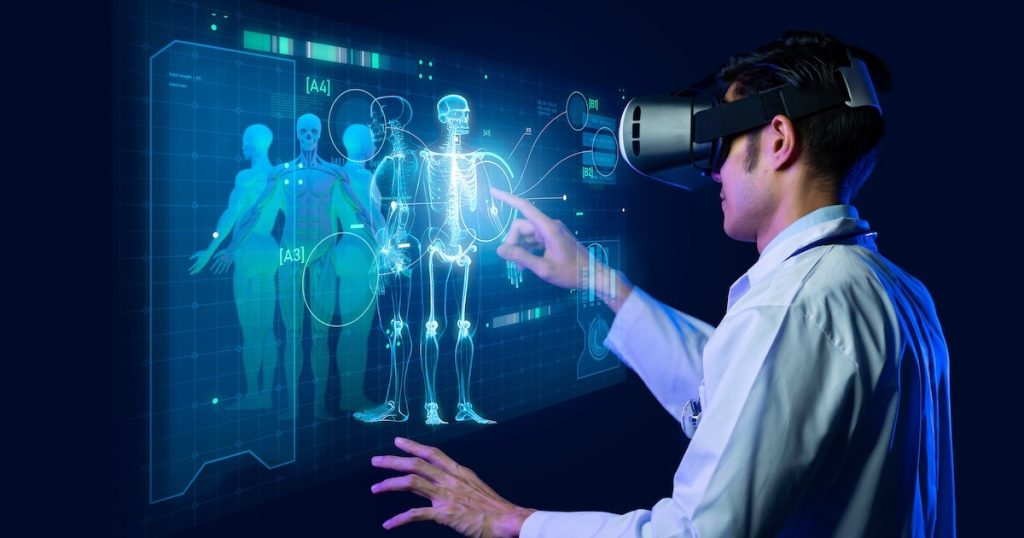Artificial Intelligence (AI) has revolutionized many industries, but perhaps none more significantly than healthcare. In the field of diagnostics, AI technologies have proven to be valuable tools in improving the accuracy, speed, and cost-effectiveness of disease detection and personalized treatment. From identifying subtle patterns in medical images to analyzing vast amounts of patient data, AI is changing the way healthcare professionals diagnose diseases and design treatment plans. This article explores how AI is reshaping healthcare diagnostics, its role in early detection, and its ability to tailor treatment plans to individual patients.
1. The Role of AI in Early Disease Diagnosis
Traditionally, disease diagnosis has relied heavily on physicians’ expertise, patient history, and clinical tests. However, the increasing complexity of modern diseases and the growing volume of medical data have made traditional methods time-consuming and error-prone. AI has become a game-changer in improving early diagnosis by processing and analyzing data faster and more accurately than humans.
a) AI in Medical Imaging
Medical imaging is one of the areas where AI has made significant advancements. Techniques like X-rays, MRIs, CT scans, and ultrasounds generate vast amounts of data that need to be interpreted by skilled professionals. AI algorithms, particularly those based on machine learning and deep learning, can analyze these images more accurately and in a fraction of the time.
AI-based image recognition systems can detect early signs of diseases such as cancer, heart disease, and neurological disorders by identifying patterns in medical images that might be too subtle for the human eye to catch. For example, AI tools have demonstrated an ability to identify lung cancer in chest X-rays with a level of accuracy comparable to that of experienced radiologists. In dermatology, AI is used to detect skin cancer and other dermatological conditions by analyzing images of moles and skin lesions.
Moreover, AI can help clinicians prioritize cases based on urgency. By highlighting the most critical findings in an image, AI allows doctors to focus on the areas that require immediate attention, speeding up the decision-making process and improving patient outcomes.
b) AI in Blood Tests and Genetic Data Analysis
AI’s role in early diagnosis is not limited to imaging. Machine learning models are also being used to analyze blood tests, genetic data, and other biomarkers to detect diseases in their early stages. For example, AI can identify patterns in genomic data that indicate a predisposition to certain diseases, such as cancer or genetic disorders. Early detection through genetic analysis can lead to preventative measures or more targeted treatments, improving patient prognosis.
AI algorithms can also analyze large datasets from clinical trials and real-world patient data, uncovering trends and correlations that might go unnoticed by human researchers. These insights can then be used to identify early indicators of diseases such as Alzheimer’s or Parkinson’s, allowing for earlier intervention and better outcomes.
2. Personalized Treatment Plans: AI Tailoring Healthcare
AI is not only improving diagnostic accuracy but also revolutionizing the way treatment plans are designed. Personalized medicine is an approach that tailors treatment based on an individual’s unique genetic makeup, lifestyle, and specific health conditions. AI has the potential to significantly enhance personalized treatment by providing physicians with data-driven insights that optimize care for each patient.
a) AI in Precision Medicine
One of the most promising applications of AI in healthcare is precision medicine. Precision medicine refers to an approach that uses genetic, environmental, and lifestyle factors to tailor treatment plans to the individual patient. AI systems can analyze a patient’s genetic data and medical history to suggest the most effective treatment options. For instance, AI algorithms can predict how a patient will respond to certain drugs based on their genetic makeup, enabling doctors to prescribe medications that are more likely to be effective and have fewer side effects.
AI also plays a crucial role in analyzing clinical data to match patients with appropriate clinical trials. By sifting through extensive databases of clinical trial information, AI can identify trials that are the best fit for individual patients, providing them with new treatment options and advancing the search for cures for various diseases.
b) AI in Oncology Treatment
In oncology, personalized treatment is particularly crucial, as every patient’s cancer may behave differently. AI is increasingly being used to analyze tumor samples, genetic mutations, and patient history to recommend the most effective treatment regimen. For instance, AI algorithms can analyze patterns in tumor biology to determine which therapies are most likely to be successful. Additionally, AI can predict how tumors will evolve over time, allowing clinicians to adjust treatment plans as the disease progresses.
Machine learning models have also been used to predict patient responses to immunotherapies, helping doctors identify candidates for these treatments early in the disease course. By integrating genomic data with clinical insights, AI is enabling oncologists to deliver highly personalized care that increases the chances of successful treatment.
3. Real-Time Diagnostics and Decision Support
Another significant advantage of AI in healthcare diagnostics is its ability to provide real-time decision support for clinicians. In fast-paced clinical environments, timely decisions can make the difference between life and death. AI systems can assist doctors by offering recommendations based on real-time data and previous patient records, helping healthcare providers make informed decisions quickly.
a) AI in Emergency Medicine
In emergency medicine, where time is critical, AI is being used to support quick decision-making. AI tools can assist doctors in diagnosing conditions like heart attacks, strokes, and sepsis by analyzing patient vital signs, medical history, and lab results in real time. For example, AI can analyze ECG readings to identify early signs of a heart attack or stroke, enabling healthcare providers to initiate treatment faster and increase the chances of patient survival.
Additionally, AI systems can help prioritize cases in busy emergency departments. By analyzing patient symptoms and risk factors, AI can triage patients based on the severity of their condition, ensuring that the most critical cases receive immediate attention.
b) AI in Remote Monitoring
AI is also playing a vital role in remote patient monitoring, especially in chronic disease management. Wearable devices that monitor vital signs, such as heart rate, blood sugar levels, or oxygen saturation, can use AI algorithms to analyze the data in real-time. This information can be shared with healthcare providers, who can make adjustments to the patient’s treatment plan based on the AI’s recommendations.
For instance, AI can detect abnormal changes in a patient’s vital signs, such as a spike in blood pressure or a drop in blood oxygen levels, and alert both the patient and their healthcare provider. This enables early intervention and helps prevent complications, particularly in conditions like diabetes, hypertension, and heart disease.

4. AI in Disease Prediction and Prevention
Beyond diagnostics and treatment, AI is helping to predict and prevent diseases before they even occur. AI’s ability to analyze massive amounts of data from various sources—such as electronic health records, genetic databases, and lifestyle factors—can help identify individuals who are at high risk for developing certain conditions.
a) AI in Cardiovascular Risk Prediction
Cardiovascular diseases remain one of the leading causes of death worldwide. AI has shown great promise in predicting cardiovascular risk by analyzing factors such as blood pressure, cholesterol levels, family history, and lifestyle choices. By identifying patients at high risk for heart disease, AI can enable early interventions, such as lifestyle changes, medications, or surgical interventions, which can reduce the likelihood of heart attacks, strokes, and other cardiovascular events.
b) AI in Early Detection of Mental Health Conditions
Mental health conditions like depression and anxiety often go undiagnosed until symptoms become severe. AI is being used to analyze speech patterns, social media posts, and even facial expressions to detect early signs of mental health issues. By identifying these issues at an early stage, AI can help initiate treatment before the condition worsens, improving long-term outcomes for patients.
5. Ethical and Privacy Concerns in AI Healthcare Diagnostics
As AI becomes more integrated into healthcare, it is crucial to address the ethical and privacy concerns associated with its use. The collection and analysis of sensitive health data raise concerns about patient privacy, data security, and the potential for algorithmic bias.
a) Data Privacy and Security
AI systems require access to large datasets of patient information to function effectively. Protecting the privacy and security of this data is essential to ensure that patients’ rights are upheld. Healthcare providers must implement strong data protection measures, such as encryption and secure storage, to prevent unauthorized access to patient records.
b) Algorithmic Bias and Fairness
AI algorithms are only as good as the data they are trained on. If training data is biased or unrepresentative, it can lead to inaccurate or unfair predictions, particularly for minority groups. To ensure that AI tools are fair and equitable, healthcare organizations must ensure that AI systems are trained on diverse datasets and regularly audited for potential biases.
6. The Future of AI in Healthcare Diagnostics
The future of AI in healthcare diagnostics holds exciting possibilities. As AI technologies continue to evolve, they will become even more integrated into healthcare systems, enabling faster diagnoses, more personalized treatment plans, and better patient outcomes. The continued advancement of machine learning algorithms, coupled with the growth of health data, will allow AI systems to become even more sophisticated, potentially revolutionizing the way healthcare is delivered across the globe.
Conclusion
AI is rapidly transforming healthcare diagnostics, offering solutions that improve early disease detection, personalized treatment plans, and predictive healthcare. Through its ability to analyze vast amounts of data quickly and accurately, AI is empowering healthcare professionals to make more informed decisions, leading to better patient outcomes. As the technology continues to evolve, its integration into healthcare systems will only increase, ultimately revolutionizing the field of medicine and the patient experience.











































